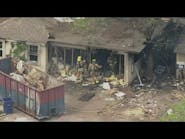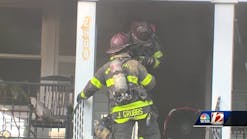Dec. 10--When a firefighter responds to the scene of an emergency, there are often risks -- from smoke and fire to active shooters.
Over the past several years, fire departments and emergency medical providers throughout the country have started to consider another risk -- the increasing rate of suicide among firefighters and emergency personnel.
"Firefighter suicides have outpaced line-of-duty deaths for four years now," said Dr. Sara Lapacka with the Arizona-based Firefighter Behavioral Health Alliance.
Earlier this fall, Lapacka came to Skagit County to conduct a workshop to help local first responders learn how to better address their mental health.
"Our culture does not allow us to appear vulnerable to one another, to seek help, to confide," said Mount Vernon Fire Chief Bryan Brice. "We need to find a way to make a comfortable environment for our folks so they realize it's OK."
While it is difficult to get an exact number of how many firefighters take their lives each year, Lapacka said numbers collected by the alliance show that suicides among firefighters have averaged about 130 a year since 2014.
"Our mantra is 'saving those who save others,'" Lapacka said. "You can't take care of others if you can't take care of yourself."
Firefighters, Brice said, tend to brush off the stresses of the job rather than address them head-on.
"We use humor, we deflect, we don't come back and say 'That call really bothered me,'" he said. "We are conditioned to feel like we have to just deal with it as opposed to saying 'Boy, I've reached my saturation level.'"
Training has long focused on the physical aspects of firefighting, such as how to prevent and recover from injuries, rather than emotional well-being, Brice said.
"It's not something that's taught in the academy," he said. "Physical health has been the main focus."
Burlington Fire Chief Levon Yengoyan equates the move toward mental health awareness to that of an increase in physical health awareness in the industry in the past several years.
A firefighter's smoky gear was once seen as a badge of honor, Yengoyan said. But with the rise of cancer rates among firefighters, departments now emphasize cleaning gear after calls to reduce health risks.
"We don't, historically, want to look at (emotional health) but we are changing," Yengoyan said. "We need to prepare our firefighters for all the aspects of the job."
With two high-profile shootings in Skagit County in 2016 -- the Sept. 23 Cascade Mall shooting and the Dec. 15 shooting of Mount Vernon police officer Michael "Mick" McClaughry -- it was a difficult year for first responders, Brice said.
Those types of incidents can be difficult to process.
"Any human can only be subjected to so many difficult situations before requiring assistance," Lapacka said. "What's important for the public to understand is first responders are human too. They don't need to be superheros all the time."
Yengoyan compared the stress that comes with the job to a concussion -- it's not necessarily the big hits that cause the most damage, it can be the repeated little ones, too.
"We have all those horrific calls all the time," Yengoyan said. "But in addition, you have all those little things, day to day, that build up."
With firefighter suicide rates on the rise, departments throughout the country have been turning to the alliance for help, Lapacka said.
"Likely due to the light shed on this epidemic, departments appear to feel more comfortable utilizing behavioral health workshops and treatments," she said in an email. "Because many departments now realize the long-term consequences of untreated behavioral health difficulties, they desire assistance in the construction and implementation of a behavioral health plan."
The alliance's workshops help normalize behavioral health as a need, and explain the signs and symptoms of depression or other mental health issues, Lapacka said.
She said after each of her workshops at least two people have sought help.
"Seeking help isn't necessarily a sign of weakness or unfit for duty," Brice said.
Brice invited Lapacka to Skagit County after seeing her speak at a conference. Members of the Anacortes, Burlington and Mount Vernon fire departments attended the local workshop, as did members of Central Valley Ambulance Authority.
"We wanted to make sure others benefited," Brice said.
The Burlington and Mount Vernon fire departments split the cost of Lapacka's visit.
While high-stress situations generally result in what are called critical incident stress management briefings, where employees can talk about the incident, those group briefings may not give all employees the help they need, Brice said.
As a former member of the Mount Vernon Police Department, Mount Vernon Mayor Jill Boudreau has experience with the stress unique to those in emergency services.
Boudreau said the city is looking at creating an employee assistance program specific to first responders.
For example, should a Mount Vernon Fire Department employee seek professional mental health support, the city would set that employee up with a professional who specializes in care for firefighters. The same would apply to police officers.
"It's a very powerful and needed conversation," Boudreau said. "I want to make sure that we're supporting our employees, and I think thinking about it in a first responder sense is critical."
In the wake of the Cascade Mall shooting, the city of Burlington, along with some partners, applied for a federal Antiterrorism and Emergency Assistance Program grant. If awarded, the grant would among other things allow the city to create support for its first responders.
Even if the city isn't awarded the grant, Burlington Mayor Steve Sexton said the city is dedicated to the mental health of its first responders.
He said he was pleased to see the discussion on first responder mental health take place.
"(The Cascade Mall shooting) gets highlighted because of how tragic it really was, but we have other events that happen pretty regularly in our community that don't rise to that level of attention, but can be just as traumatic," Sexton said.
Yengoyan and Brice hope Lapacka's workshop is the beginning of something more. Both want to increase the peer support systems available within their departments, including training supervisors to spot warning signs.
"It really rang true for them, the need to take that self-assessment, the need to look out for their friends, their coworkers, their peers," Yengoyan said of Lapacka's talk. "We want to continue to look at that and say, 'How do we continue to do better in this area?'"
His goal, he said, is to have employees be more prepared for the impact a difficult call can have, learn how to evaluate themselves and others, and know how to seek help if needed.
"Together we can constantly build a much better system to take care of each other," Yengoyan said. "You don't all of a sudden just do it -- you have to practice. It's something we need to train them for."
___ (c)2017 the Skagit Valley Herald (Mount Vernon, Wash.) Visit the Skagit Valley Herald (Mount Vernon, Wash.) at www.goskagit.com Distributed by Tribune Content Agency, LLC.






